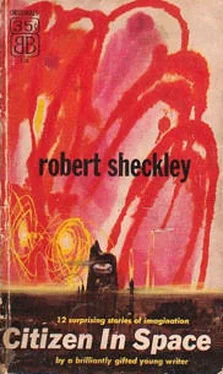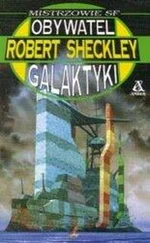Lek asked other questions, and Answerer was unable to answer them. Lek viewed things through his specialized eyes, extracted a part of the truth and refused to see more. How to tell a blind man the sensation of green?
Answerer didn't try. He wasn't supposed to.
Finally, Lek emitted a scornful laugh. One of his little stepping-stones flared at the sound, then faded back to its usual intensity.
Lek departed, striding swiftly across the stars.
Answerer knew. But he had to be asked the proper questions first. He pondered this limitation, gazing at the stars which were neither large nor small, but exactly the right size.
The proper questions. The race which built Answerer should have taken that into account, Answerer thought. They should have made some allowance for semantic nonsense, allowed him to attempt an unravelling.
Answerer contented himself with muttering the answers to himself.
Eighteen creatures came to Answerer, neither walking nor flying, but simply appearing. Shivering in the cold glare of the stars, they gazed up at the massiveness of Answerer.
"If there is no distance," one asked, "Then how can things be in other places?"
Answerer knew what distance was, and what places were. But he couldn't answer the question. There was distance, but not as these creatures saw it. And there were places, but in a different fashion from that which the creatures expected.
"Rephrase the question," Answer said hopefully.
"Why are we short here," one asked, "And long over there? Why are we fat over there, and short here? Why are the stars cold?"
Answerer knew all things. He knew why stars were cold, but he couldn't explain it in terms of stars or coldness.
"Why," another asked, "Is there a rule of eighteen? Why, when eighteen gather, is another produced?"
But of course the answer was part of another, greater question, which hadn't been asked.
Another was produced by the rule of eighteen, and the nineteen creatures vanished.
Answerer mumbled the right questions to himself, and answered them.
"We made it," Morran said. "Well, well." He patted Lingman on the shoulder — lightly, because Lingman might fall apart.
The old biologist was tired. His face was sunken, yellow, lined. Already the mark of the skull was showing in his prominent yellow teeth, his small, flat nose, his exposed cheekbones. The matrix was showing through.
"Let's get on," Lingman said. He didn't want to waste any time. He didn't have any time to waste.
Helmeted, they walked along the little path.
"Not so fast," Lingman murmured.
"Right," Morran said. They walked together, along the dark path of the planet that was different from all other planets, soaring alone around a sun different from all other suns.
"Up here," Morran said. The legends were explicit. A path, leading to stone steps. Stone steps to a courtyard. And then — the Answerer!
To them, Answerer looked like a white screen set in a wall. To their eyes, Answerer was very simple.
Lingman clasped his shaking hands together. This was the culmination of a lifetime's work, financing, arguing, ferreting bits of legend, ending here, now.
"Remember," he said to Morran, "We will be shocked. The truth will be like nothing we have imagined."
"I'm ready," Morran said, his eyes rapturous.
"Very well. Answerer," Lingman said, in his thin little voice, "What is life?"
A voice spoke in their heads. "The question has no meaning. By 'life' the Questioner is referring to a partial phenomenon, inexplicable except in terms of its whole."
"Of what is life a part?" Lingman asked.
"This question, in its present form, admits of no answer. Questioner is still considering 'life' from his personal, limited bias."
"Answer it in your own terms, then," Morran said.
"The Answerer can only answer questions." Answerer thought again of the sad limitation imposed by his builders.
Silence.
"Is the universe expanding?" Morran asked confidently.
" 'Expansion' is a term inapplicable to the situation. Universe, as the Questioner views it, is an illusory concept."
"Can you tell us anything?" Morran asked.
"I can answer any valid question concerning the nature of things."
The two men looked at each other.
"I think I know what he means," Lingman said sadly. "Our basic assumptions are wrong. All of them."
"They can't be," Morran said. "Physics, biology —"
"Partial truths," Lingman said, with a great weariness in his voice. "At least we've determined that much. We've found out that our inferences concerning observed phenomena are wrong."
"But the rule of the simplest hypothesis —"
"It's only a theory," Lingman said.
"But life — he certainly could answer what life is?"
"Look at it this way," Lingman said, "Suppose you were to ask, 'Why was I born under the constellation Scorpio, in conjunction with Saturn? I would be unable to answer your question in terms of the zodiac, because the zodiac has nothing to do with it."
"I see," Morran said slowly. "He can't answer questions in terms of our assumptions."
"That seems to be the case. And he can't alter our assumptions. He is limited to valid questions — which imply, it would seem, a knowledge we just don't have."
"We can't even ask a valid question?" Morran asked. "I don't believe that. We must know some basics." He turned to Answerer. "What is death?"
"I cannot explain an anthropomorphism."
"Death an anthropomorphism!" Morran said, and Lingman turned quickly. "Now we're getting somewhere!"
"Are anthropomorphisms unreal?" he asked.
"Anthropomorphisms may be classified, tentatively, as, A, false truths, or B, partial truths in terms of a partial situation."
"Which is applicable here?"
"Both."
That was the closest they got. Morran was unable to draw any more from Answerer. For hours the two men tried, but truth was slipping farther and farther away.
"It's maddening," Morran said, after a while. "This thing has the answer to the whole universe, and he can't tell us unless we ask the right question. But how are we supposed to know the right question?"
Lingman sat down on the ground, leaning against a stone wall. He closed his eyes.
"Savages, that's what we are," Morran said, pacing up and down in front of Answerer. "Imagine a bushman walking up to a physicist and asking him why he can't shoot his arrow into the sun. The scientist can explain it only in his own terms. What would happen?"
"The scientist wouldn't even attempt it," Lingman said, in a dim voice; "he would know the limitations of the questioner."
"It's fine," Morran said angrily. "How do you explain the earth's rotation to a bushman? Or better, how do you explain relativity to him — maintaining scientific rigor in your explanation at all times, of course."
Lingman, eyes closed, didn't answer.
"We're bushmen. But the gap is much greater here. Worm and superman, perhaps. The worm desires to know the nature of dirt, and why there's so much of it. Oh, well."
"Shall we go, sir?" Morran asked. Lingman's eyes remained closed. His taloned fingers were clenched, his cheeks sunk further in. The skull was emerging.
"Sir! Sir!"
And Answerer knew that that was not the answer.
Alone on his planet, which is neither large nor small, but exactly the right size, Answerer waits. He cannot help the people who come to him, for even Answerer has restrictions.
He can answer only valid questions.
Universe? Life? Death? Purple? Eighteen?
Partial truths, half-truths, little bits of the great question.
But Answerer, alone, mumbles the questions to himself, the true questions, which no one can understand.
How could they understand the true answers?
Читать дальше







